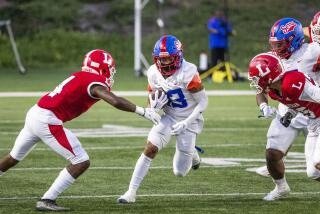Science / Medicine : Child Sports: Win 1, Lose 1
- Share via
American youths may be fatter than they once were, and they certainly are less fit. Study after study over the last few years have shown that children in the United States perform worse physically than their counterparts did 10 years ago and their contemporaries in other countries do today. One of the reasons, said Dr. James G. Garrick, director of the Center for Sports Medicine at St. Francis Memorial Hospital in San Francisco, is that pediatricians and parents have become overly cautious about the risks of injuries associated with sports and young children.
In fact, Garrick said, recent studies have shown conclusively that the risk of injury increases only as the age and skill of the athlete rises, whether they are doing gymnastics or playing on the soccer field. “It is participation of the sort we see on TV, the (top) athlete that occasionally gets hurt. . . . It is not the children who gather for a game of school football,” Garrick said. “Little children playing football are too smart to play football like football players.”
But experts in the field also caution that beginning organized sport at too early an age is a waste of time. Children under the age of 5 simply don’t comprehend the notion of team cooperation, child development experts say. And as far as infants go, the experts are now urging even more caution. This month, for example, the American Academy of Pediatrics recommended that parents avoid structured exercise programs for infants, arguing that no evidence exists to suggest that the programs either advance skills or provide any long-term benefits to normal youngsters.






